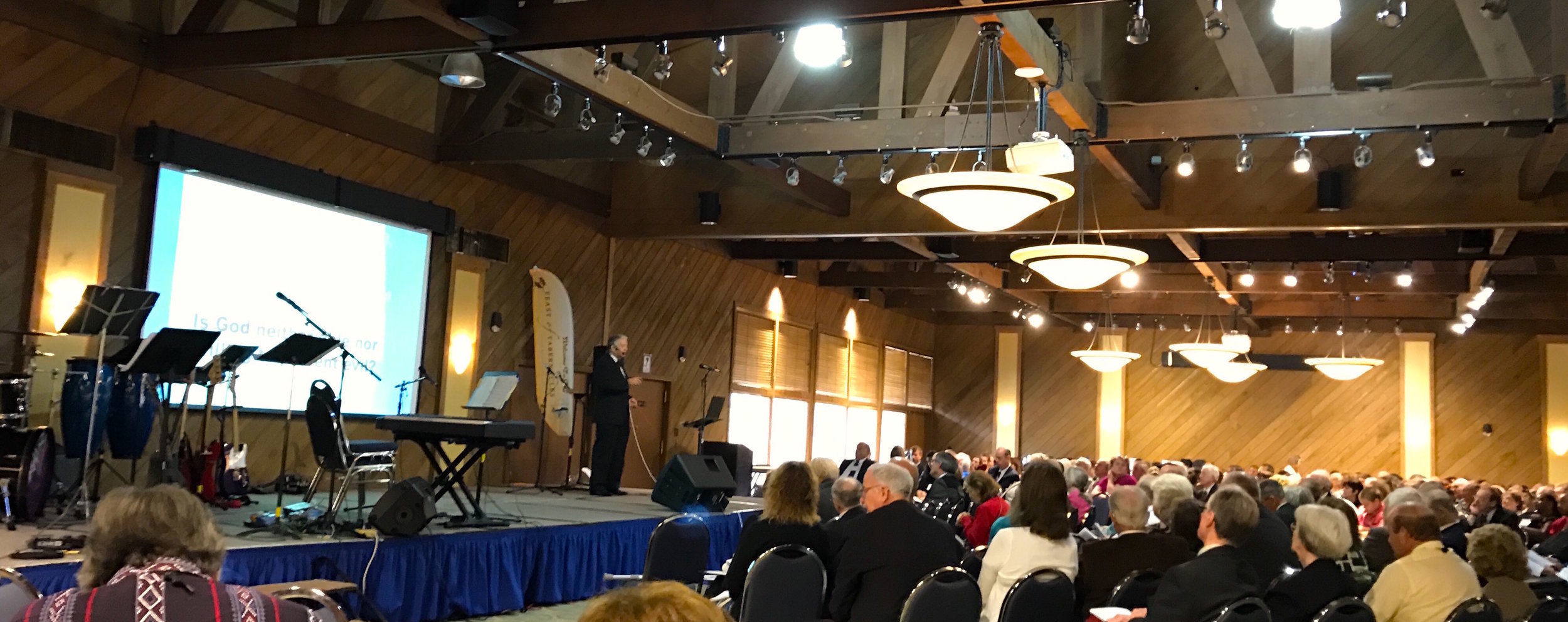
Blog

Make a Joyful Noise Together
I know that I have written about music before, but the other day I heard something that I didn’t even know in regards to music. I was driving to town listening to a radio program, and the speaker was listing all the benefits of singing with other people. Studies have shown that group singing benefits our health and well-being. I knew I enjoyed singing, but I didn’t know that there were actually positive health benefits to singing, especially when you sing in a group.

When No One is Watching
The other day my family and I were watching a fun series called Brain Games, and in one episode about lying, it had a study done with children. The premise was to have a group of children sit at a table with this tasty chocolate cake, and an adult would tell them that they were not to have any of the cake. In fact, they could not even touch the cake. Then the adult would leave the room to watch the children behind a two-way mirror. All but one of the kids could not resist the temptation.

PULLING TOGETHER IN THE YOKE
In a recent blog, I talked about “tugging against the leash.” In a comment to that blog, a reader responded with this:
“The more we trust in God, the more we understand that His yoke (leash) really is pretty light.” The comparison of God’s “leash” to His yoke being referenced here is in Matthew 11:29-30 which states:

LIVE AND WALK IN THE SPIRIT
We are admonished by the apostle Paul to “walk in the Spirit” (Galatians 5:16). I have read this and other verses talking about our spiritual walk for years, but the meaning of the concept never really “clicked” with me like it did during a recent study on the subject.
Paul talks about being led by the Spirit in two ways. First, he says that those who are led by the Spirit, they are the sons of God (Romans 8:14).

Weed of Bitterness
I have written many blogs that mention bitterness, but I have never written about it directly. Recently, I have noticed a lot of bitterness within people, even within God’s ecclesia. However, bitterness should never be allowed to grow within us. It is a fleshly weed that must be plucked out.
Bitterness is defined by Google as “anger and disappointment at being treated unfairly; resentment.”

Imperfection
I’m so grateful to have a loving, patient, forgiving, compassionate God because I am imperfect. One of my many imperfections is I sometimes speak before I think and my words runneth over. It is something that I will probably continue to strive to overcome, and I am grateful that God understands. He knows that “we all stumble in many ways. If anyone does not stumble in what he says, he is a perfect man, able to bridle the whole body as well” (James 3:2).

TUGGING AGAINST THE LEASH
As I walked with our new puppy, he was having a bit of a rough day. He was jumping, yelping, gyrating, and doing everything he could to get away from this thing that was not letting him go anywhere he wanted to go. It was a leash attached to his collar, which was a new experience for him. He had never been on leash before. The collar was something he was used to by the time we got him, but this leash deal—now that is something entirely different.

WHAT IS YOUR SPIRITUAL VOLTAGE?
Most of us are familiar with what a power plant is. It is a place where electricity is generated. There are many different levels of electricity that power plants will produce, but the amount of power that is typically generated by a power plant will be somewhere between 155,000 volts to 786,000 volts depending on the size and type of plant it is. Suffice it to say, even the smaller voltage is a lot of power!

AS A ROARING LION
Chicken carcasses lay everywhere. The smell of fresh death hung heavy in the air. Only six of our 38 chickens were left inside the coupe, huddled in a corner with obvious fear in their little eyes. The scene was heartbreaking.
Kristin and I had just arrived home from visiting with my cousin. As our custom is, we had let the chickens outside of their large chicken run to free range in the yard for a couple of hours before sundown.

Ok, now what?
Do you ever ask yourself what you are supposed to do now that you are a Christian? I do. I know that I can’t rely on someone else to do my Christian walk for me. I know that there is no one in between my Savior and me. I also know that salvation is a gift from God, not something we earn. However, we are to live lives that let our “light shine before others, so that they may see [our] good works and give glory to [our] Father who is in heaven” (Matthew 5:16, emphasis mine).

ACCEPTING 100 PERCENT RESPONSIBILITY
My wife and I just returned from a conference where the keynote speaker was Jack Canfield, co-author of the Chicken Soup for the Soul series of books. In the world of authorship, Jack is unique. Most authors would be happy to write one book that hits the New York Times bestseller list and sells one million copies within their writing career. Jack has written 47 books that have hit the New York Times bestseller list, and since writing the first Chicken Soup book, sold well over 500 million books. He is also in The Guinness Book of World Records for having seven books on the New York Times bestseller list at the same time.

Armstrongism
The other day, I was reading a comment on a blog regarding COGs and it basically grouped them all in the term “Armstrongism.” I have heard the term before, but honestly, I have never really looked into what defined something as being “Armstrongism” until reading some derogatory comments regarding COGs.
I am not at all easily offended, and I know a lot of people can’t seem to get over the bad things they went through in the past due to Worldwide Church of God and the churches that split off from them. Bitterness is a hard weed to pull out of oneself once it has rooted deeply within one’s soul.

Wonderful
We just had Thanksgiving, and I had one of those “aha” moments. My husband and I hosted Thanksgiving this year for the first time in a long time, mainly because we haven’t had a house large enough to host. So, this year we decided to host since finally we have the space to do so.
Well, you know the normal questions people ask which usually are “How are things going?” or “How are you doing?”

MORE THAN I DESERVE
What am I thankful for? I am thankful that I have been given more than I deserve.
In the United States of America, we just celebrated a national holiday called Thanksgiving. Summarizing the history of the day briefly, it is a day on which, in the fall of 1621 A.D. the Plymouth colonists, the remains of a group of religious separatists from England, hosted a three-day feast with approximately 90 Native Americans.

Oh, the world doesn’t revolve around me?
Humans in general can tend to be very selfish and sometimes egocentric. Some may call it our survival instincts. But usually I believe, we just we like to get our way, and we do not like it when we don’t. However, I have long figured out that things usually do not go our way, and that people don’t always agree with my opinions either. In fact, the world does not and will never revolve around me, so I better get over myself if I want to enjoy life in general.

MAKE AMERICA GREAT AGAIN
Having just finished a horrific election cycle in the United States of America, I want to talk about a phrase taken from the campaign of president-elect Donald Trump. Mr. Trump anchored his entire campaign to this concept using the phrase: “MAKE AMERICA GREAT AGAIN”.
This will NOT be a blog about politics, or the carnage we witnessed over the past year and a half during that run for the presidency. I personally would like to remove myself as far as possible from the evil of that race and never think of it again.

Don’t Take Life for Granted
Do you ever say, “next year I’m going to do…. Or tomorrow I will do…”? I do a lot. I think it is just engraved in us to live forever. Therefore, we plan, sometimes years in advance, of what we “will do.” However, life is unexpected. We honestly have no idea what we are going to do tomorrow, let alone years from now. I believe that is why James tells us not to say what we are going to do tomorrow because we “do not even know what will happen tomorrow!

WHEN YOUR CUP RUNNETH OVER…FILL SOMEONE ELSE’S CUP
The Psalmist declared that, in His care for him, the Lord provided so much abundance that his cup overflowed (Psalm 23:5). What did David mean by this? In context of the psalm he was writing, he talked about God providing sustenance, even when being chased by his enemies, and healing ointment for his head and body. But is that all this verse is about

Clarity
Do you ever find yourself asking God to tell you what He wants you to do with your life? Well, I do a lot. Especially during those times when I thought I was going in the right direction, but nothing was going well for me. I started getting confused and started doubting my decisions. During these times I wish God had a cell phone that He would answer. I know that we have prayer, but wouldn’t it be nice if He told us exactly what He wants us to do in every situation we face in life? Wouldn’t it be awesome if we weren’t looking through a dark glass (1 Corinthians 13:12) and instead we had complete clarity?

Working Together in Unity
The Body can heal. The Body can work in unity. The Body can show love. The Body of Christ, His people, can actually communicate across organizational lines as long as we are willing to make the effort.
I had the privilege to be a part of a Feast site at Land Between the Lakes, Kentucky this year where three different groups worked together. They were Church of God International, Christian Educational Ministries, and United Church of God.
